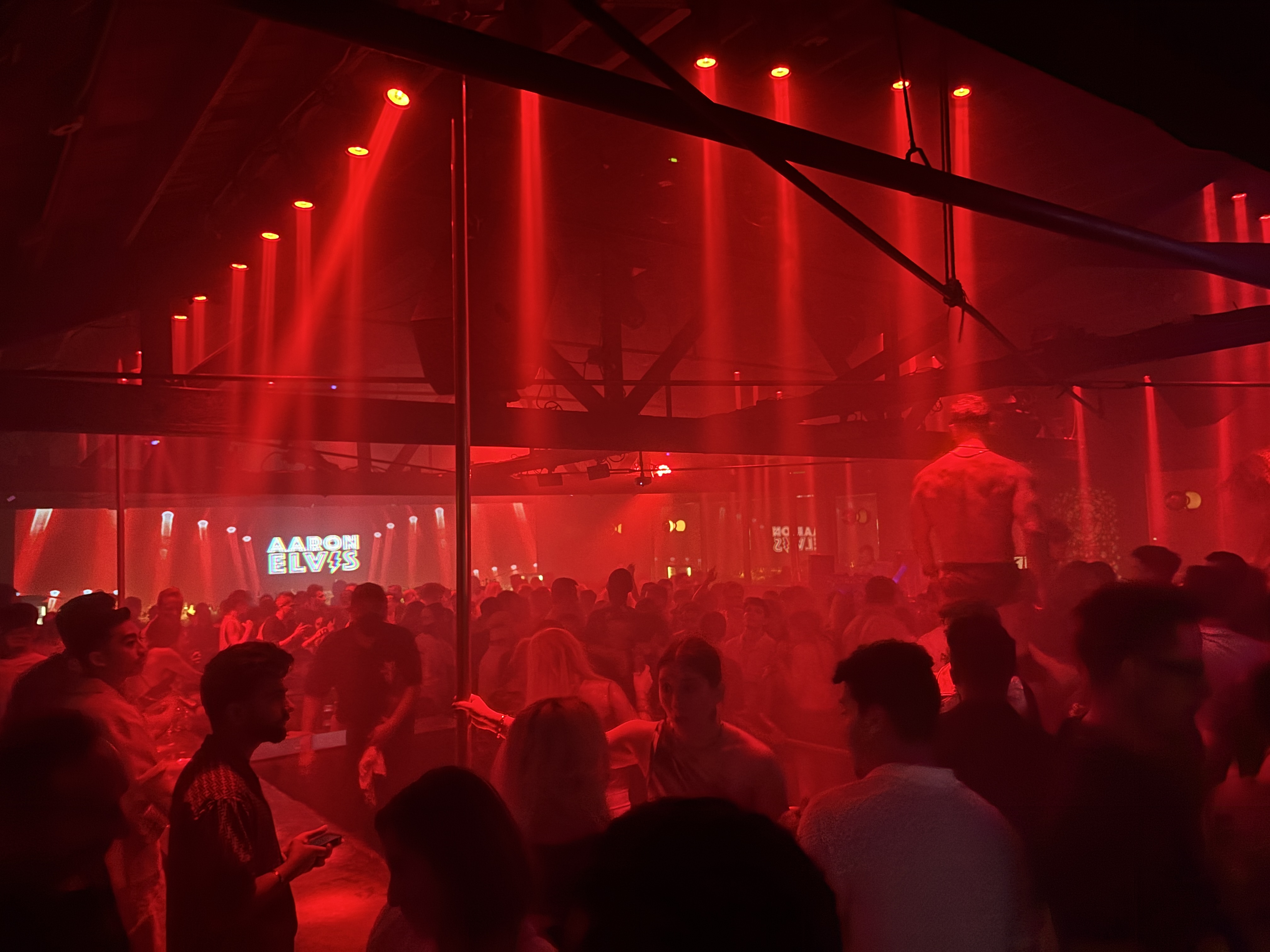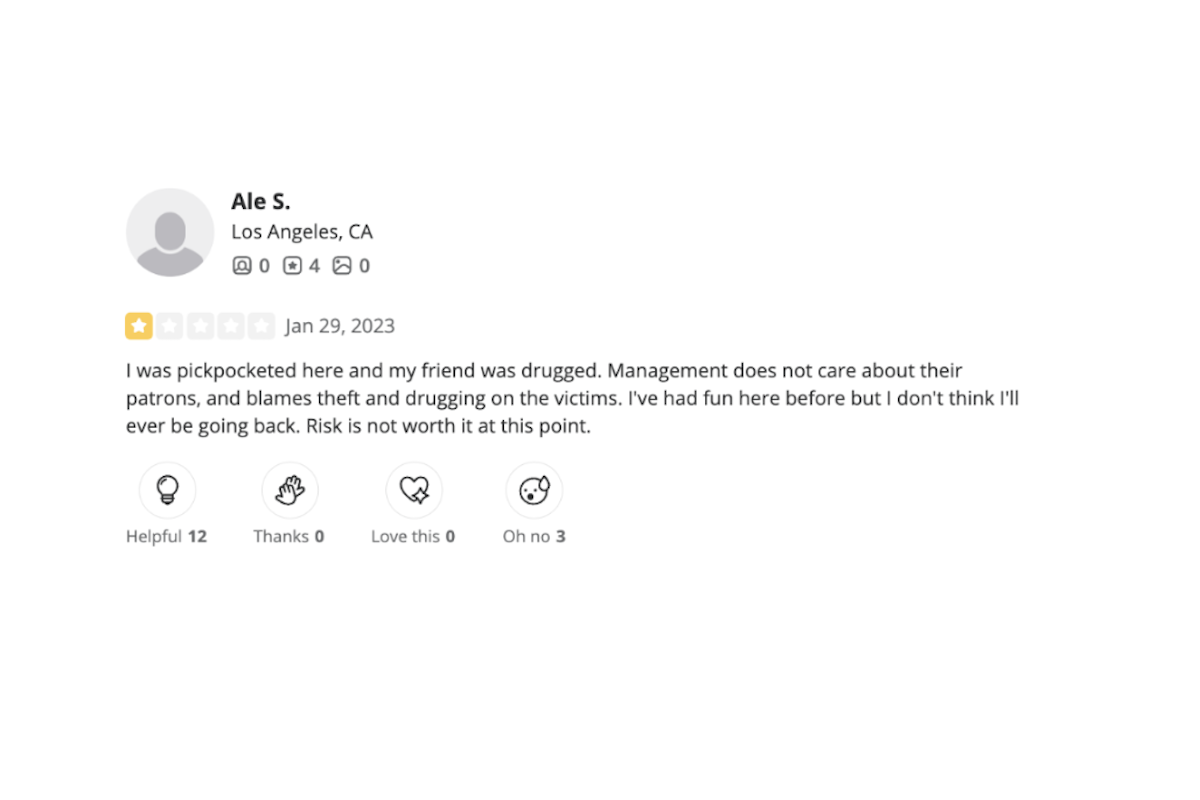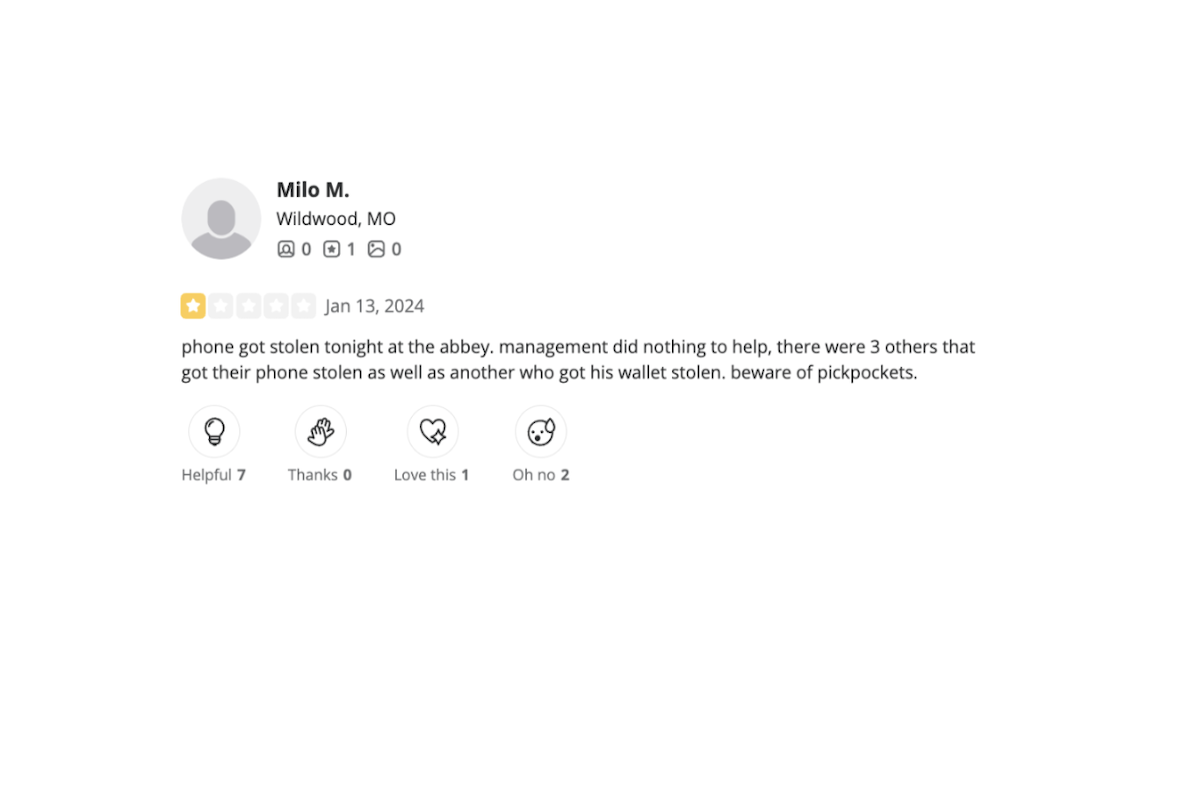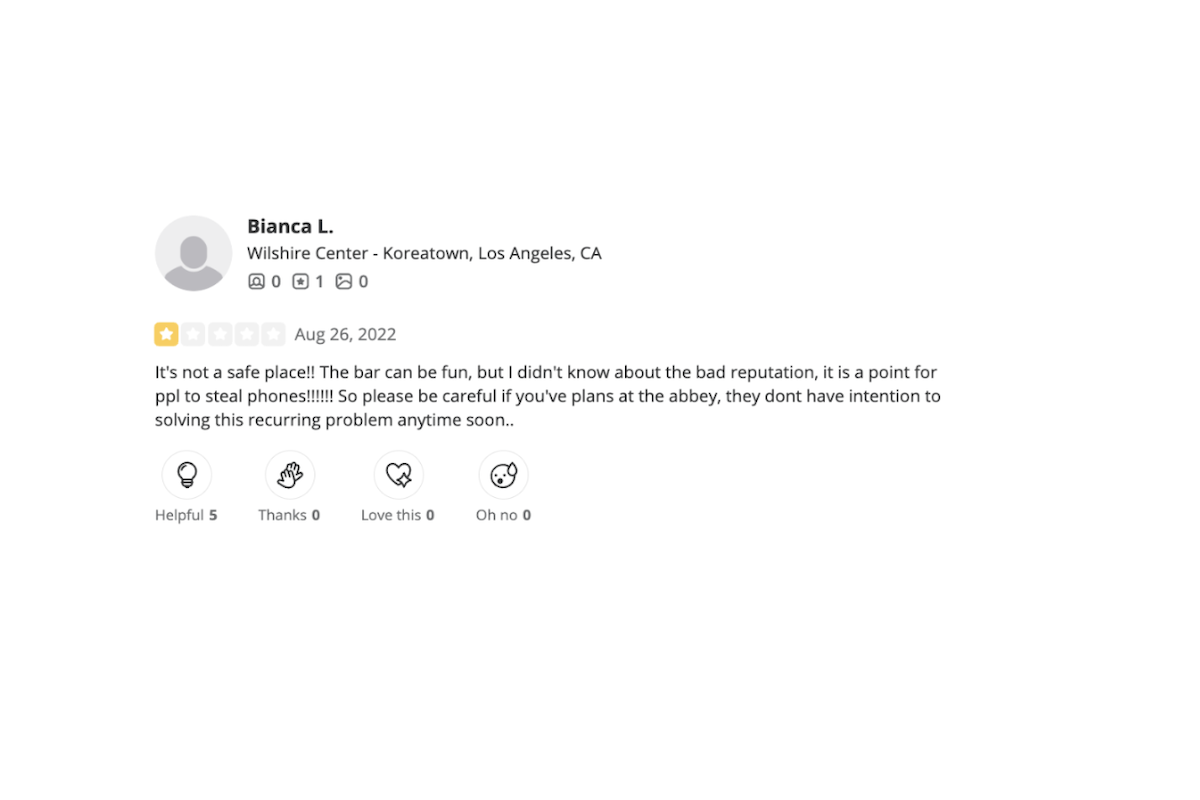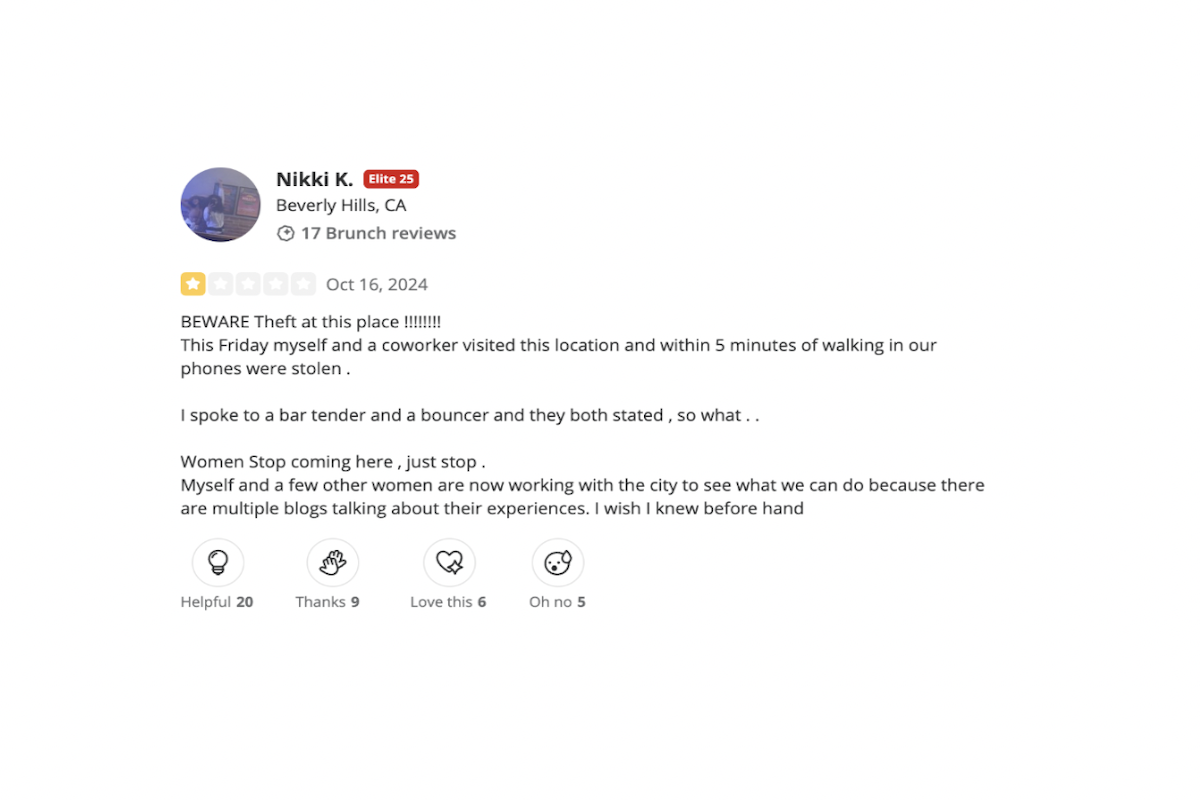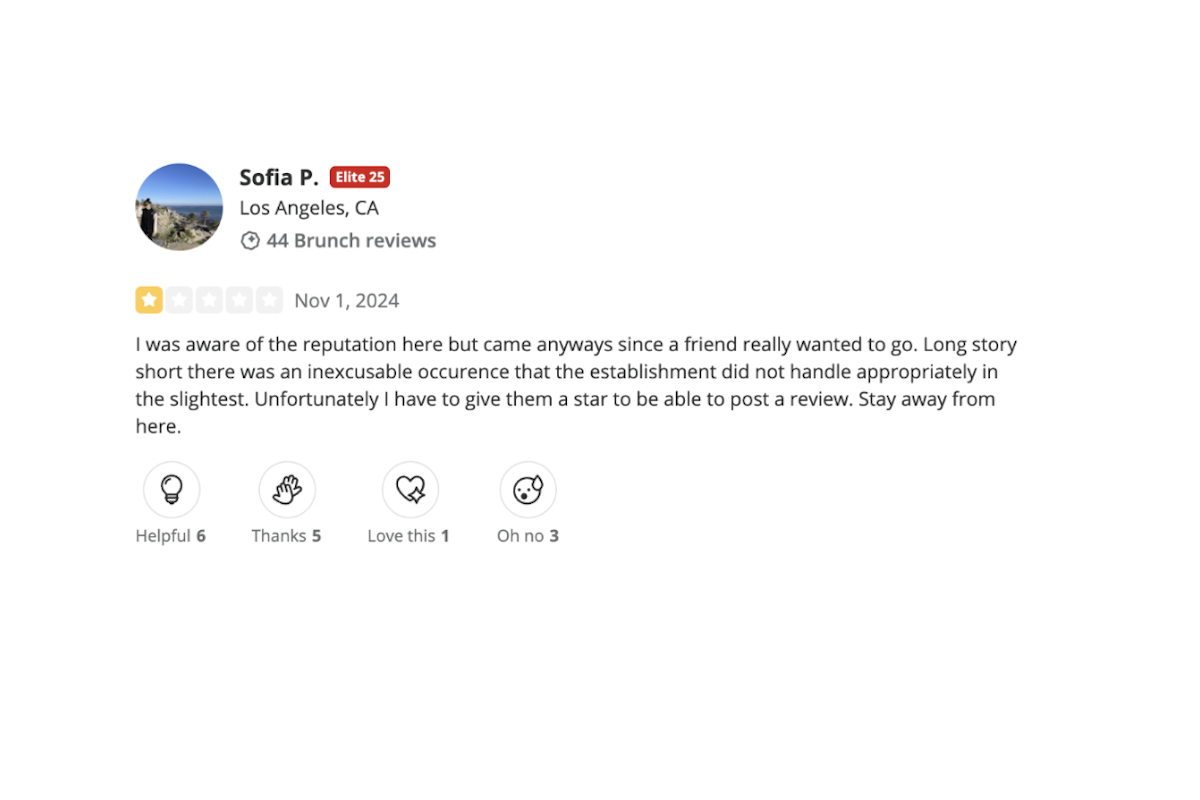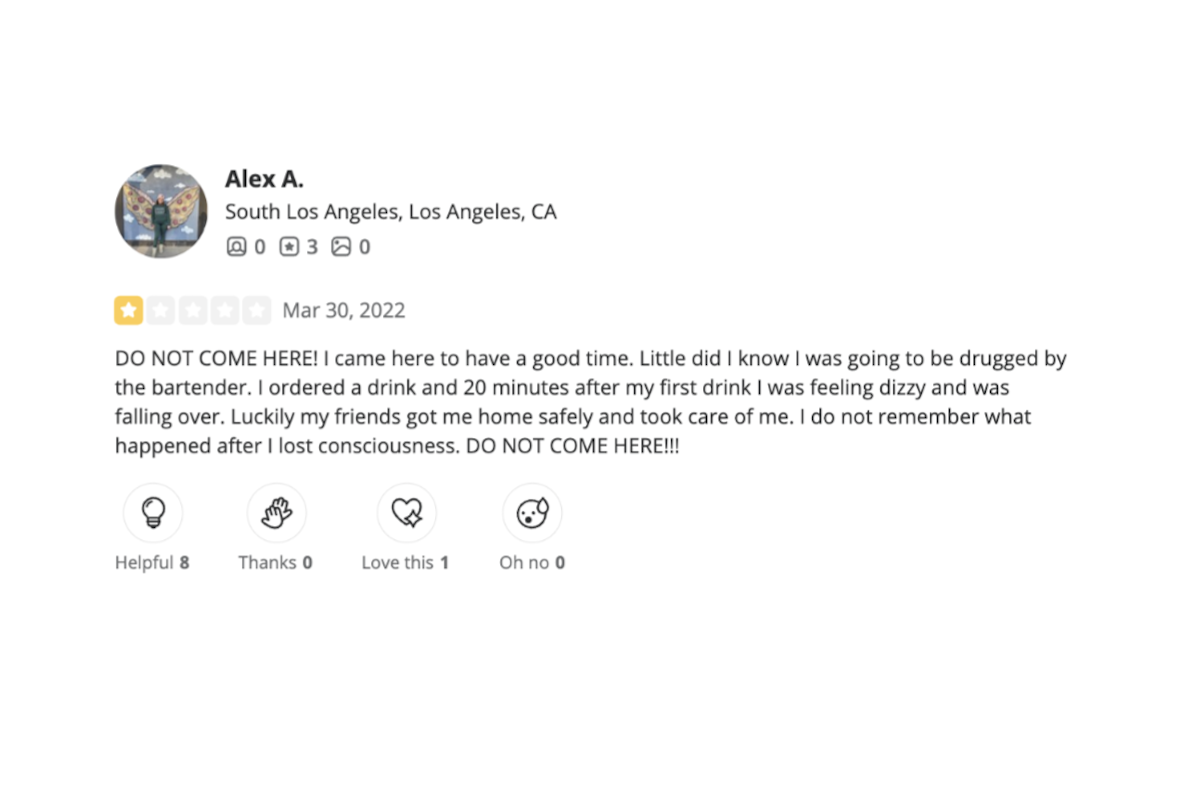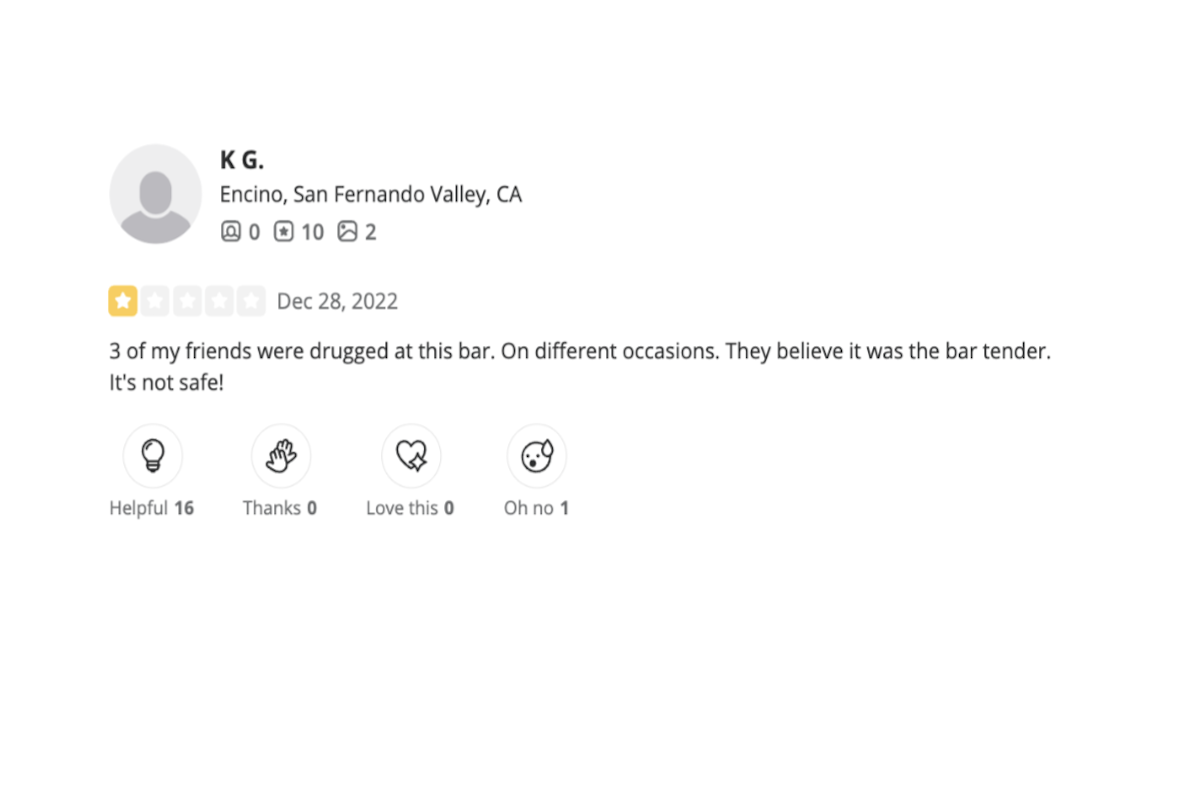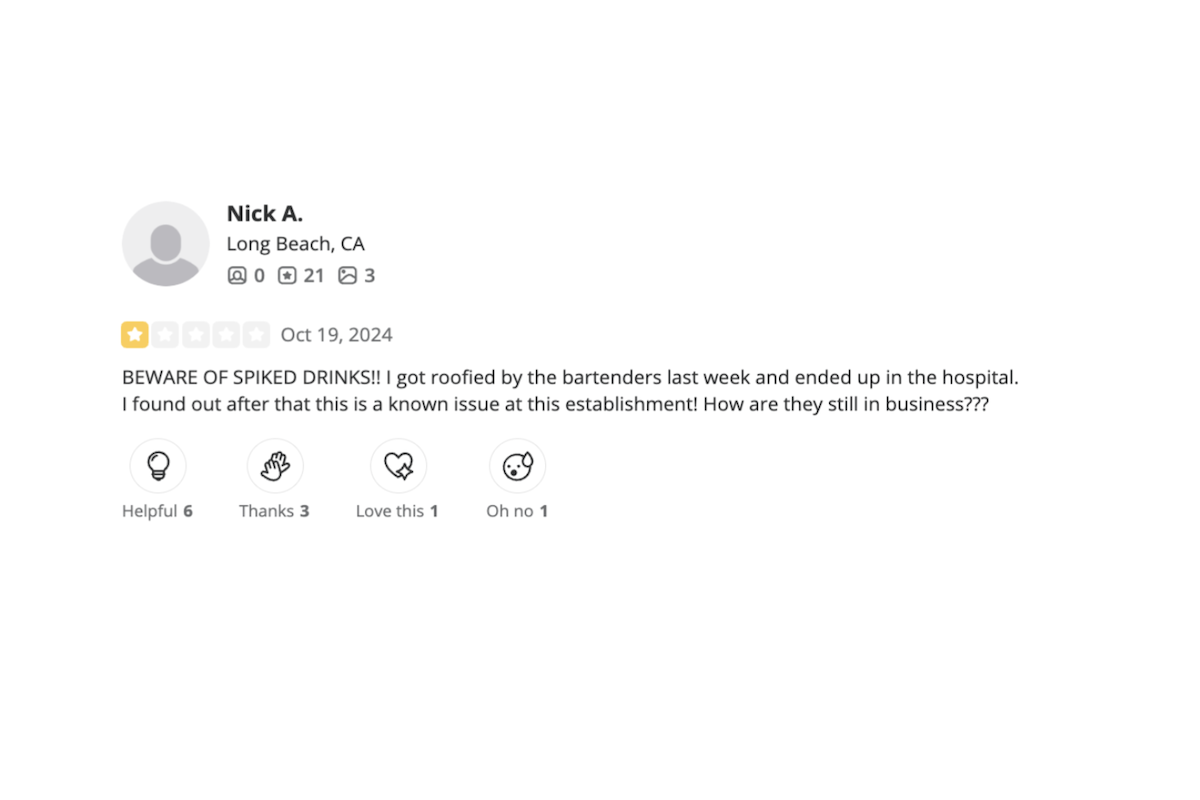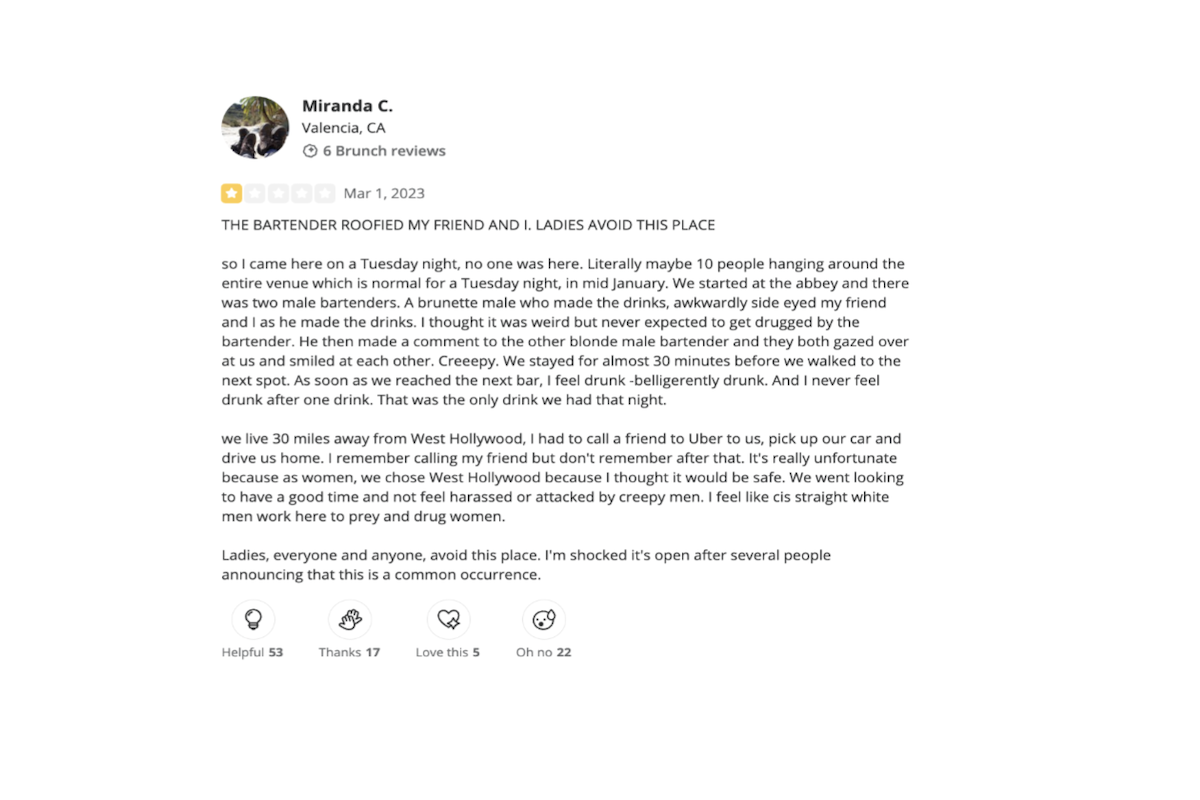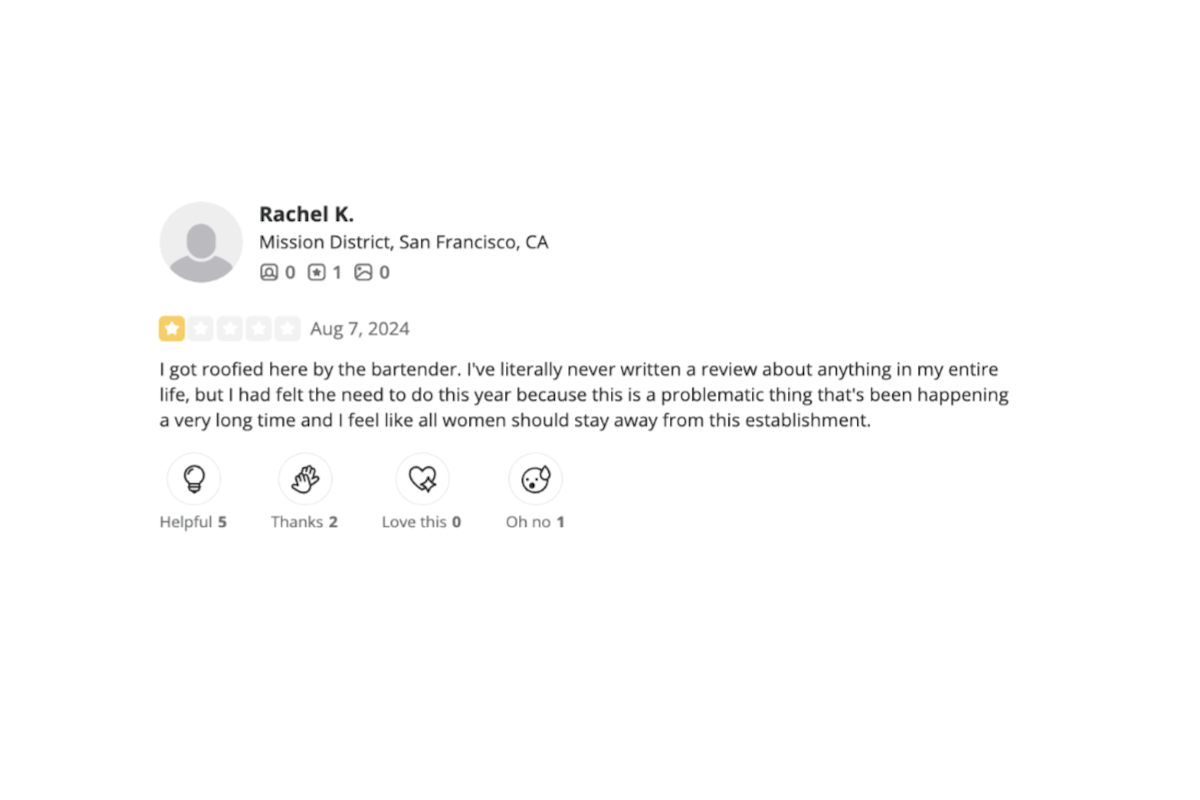The Vanishing Hours
“Something’s not right here.”
Adam Carbone had just one drink at The Abbey Bar and Grill in West Hollywood before noticing something was off.
“Just one feels like seven,” said Carbone. “And then by the time you realize it, it’s too late. It’s seven in the morning, and you’re eight blocks down the street not knowing what the hell happened.”
Carbone isn't alone. The Abbey is a staple of West Hollywood nightlife and the namesake of Chappell Roan’s "Pink Pony Club." It is also the subject of allegations of pickpocketing and druggings by multiple patrons. Three lawsuits have been filed against the bar. All have been settled.
The Abbey has denied any accusations of wrongdoing. In a statement to the 19th, the bar said that "when anyone reports a crime to The Abbey, including suspected druggings, we ask them to file a police report immediately. We are well known for our cocktails. For some people, one drink is more than enough. Ultimately, it is up to individuals to know their limits.”
Jason M., whose last name is omitted for safety reasons, believes he knows his limits very well in his thirties. He alleges he was drugged at The Abbey.
“I’ve had much, much crazier nights,” he said. “Nights where I’ve had much more than three drinks where I don’t end up on Venice Boulevard at 4 a.m. unconscious and my legs don’t work.”
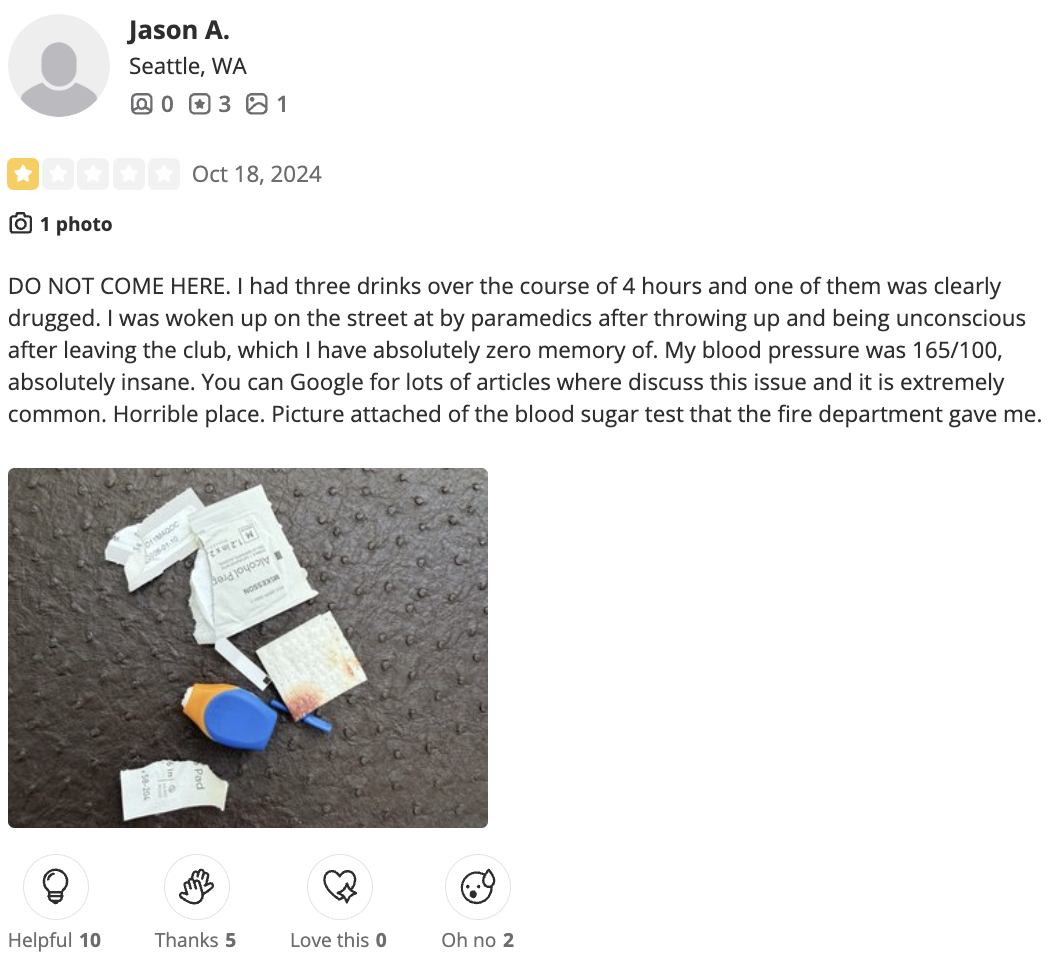
Jason recalls putting his drink down briefly to dance, unknowingly giving ample opportunity for someone to slip something into his glass.
“It’s as simple as passing your hand over someone’s drink,” said Maddy Brown, a frequent partygoer in West Hollywood. Brown lost a phone to the infamous pickpockets of WeHo before. She now has a comprehensive strategy to avoid both pickpockets and would-be drink-spikers.
Brown, a student at the University of Southern California in the class of 2025, only goes out in big groups, often bringing just a couple of phones between them. She wears a cross-body zip, keeping one hand on it the entire night. It has become muscle memory, she said.
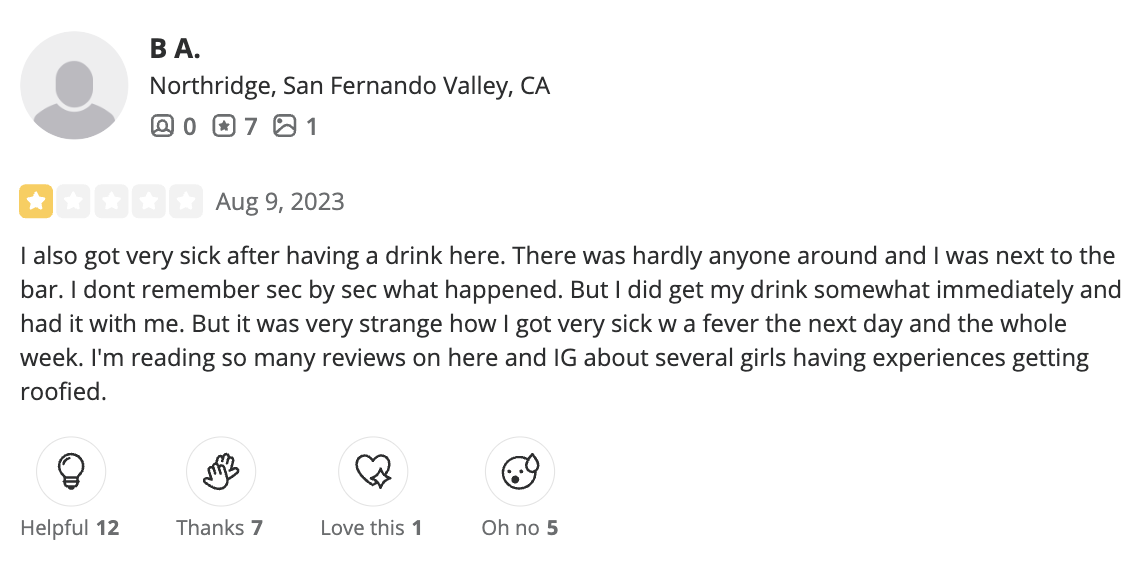
To Brown, The Abbey was both well-known as “the best club on the strip” and “notorious” for drug violence.
She almost never buys drinks in WeHo and had “absolutely not” had a drink at The Abbey before, despite having been there to dance many times. One night in July, 2024, she did.
Her friend, and designated driver of the night, Adrian Quiñones had gotten the drink directly from the bartender, leading Brown to believe that she’d be okay this one time. Careful to keep an eye on, and hand over her drink, she got just halfway through it before starting to feel off.
She had had just one drink before going out, and “never in [her] life had [she] been so messed up off of two drinks.”
In a daze, Brown checked her cross-body for her phone. It wasn’t there.
“That’s when all hell broke loose.”
“After that, it starts to come more in flashes,” said Brown. She described the rest of her night as “some blanks filled in, with a whole lot of nothing.”
When Addie Lillard described her night at The Abbey to her nurse at the Cedars-Sinai Medical Center in West Hollywood, her nurse felt certain of what had happened.
Lillard, also a USC student in the class of 2025, had been taken to the nearest hospital. Like many others, initially she blamed herself.
“Where were you? The Abbey?” the nurse asked.
“Yeah, you were roofied.”
The Reputation
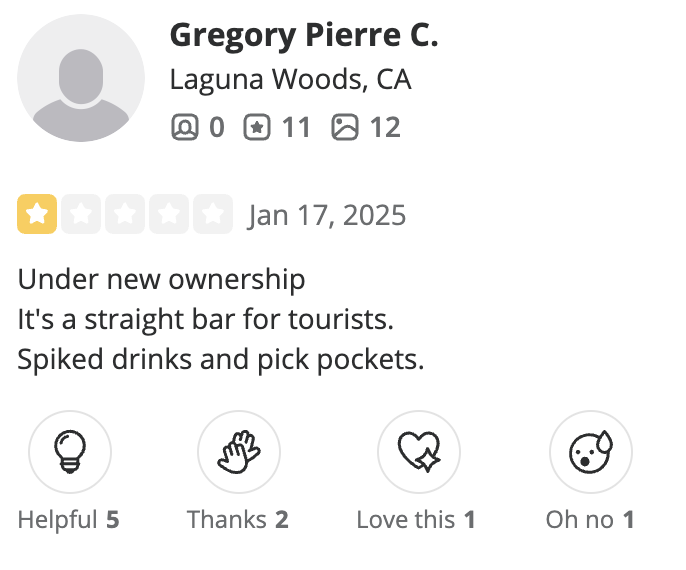
Under new ownership, many reviews suggest not much has changed.
David Cooley founded The Abbey in 1991 originally as a small coffee shop. Since then, it has become a 21+ club and the face of WeHo’s queer nightlife and advocacy, even hosting the likes of former Vice President Kamala Harris and ex-Secretary of Transportation Pete Buttigieg for campaign events.
In November, 2023, Cooley sold The Abbey for a reported $27 million to entrepreneur Tristan Schukraft.
By day, it is a restaurant and bakery. By night, go-go dancers hang from ceilings and partygoers lose their inhibitions. Some lose much more.
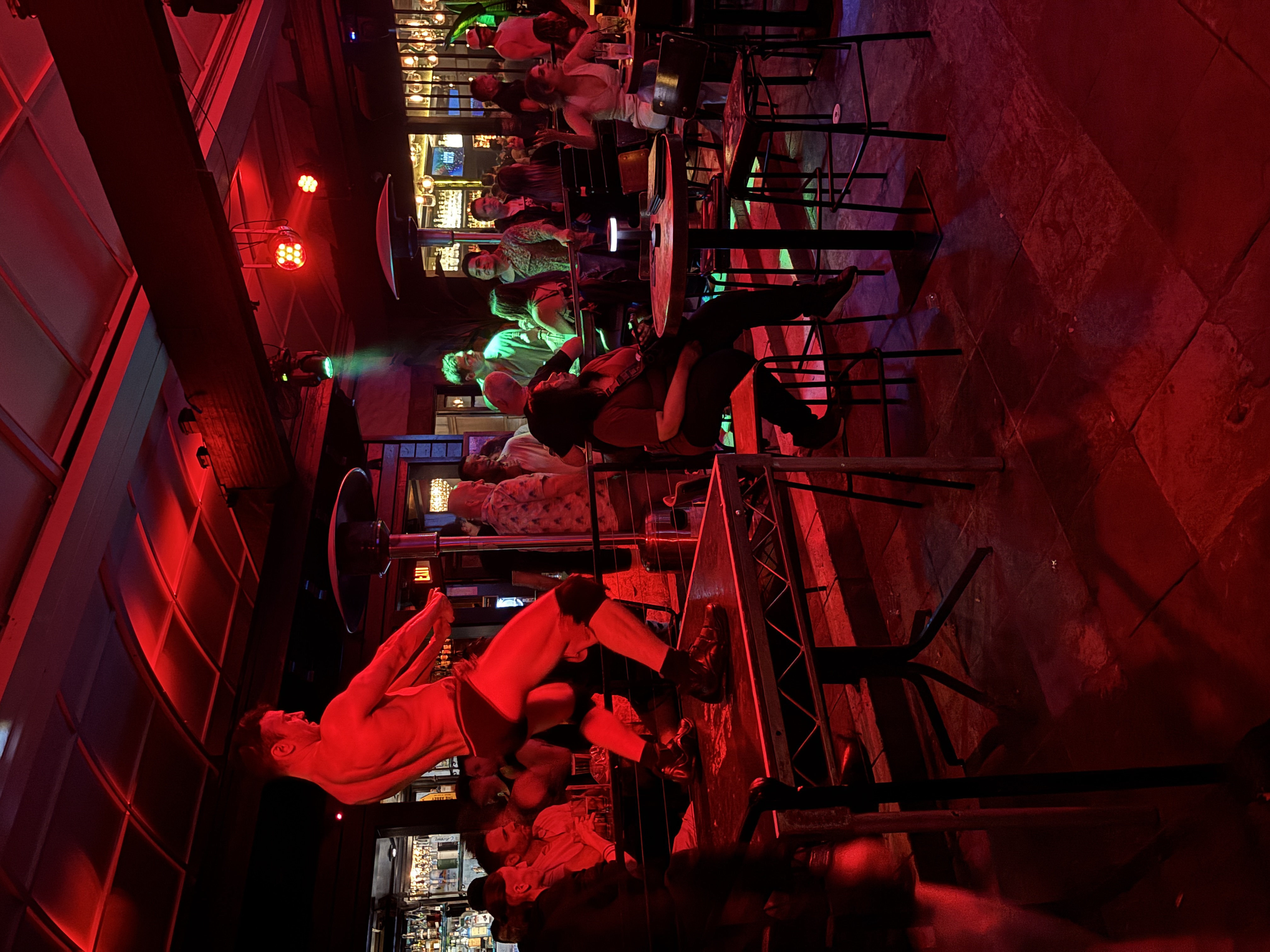
A go-go dancer entertains patrons at The Abbey.
Jason, like Brown, visited The Abbey despite its reputation. “It’s one of those things where it’s like, ‘Oh, it’s not gonna happen to me,’” he said.
Lillard, from Pasadena, was unaware of any such allegations before going to The Abbey. After her experience that landed her in the hospital, she asked around and started to notice a pattern.
She estimated about one in every three people she told about her alleged drugging at The Abbey responded, “Oh yeah, that happens there.”
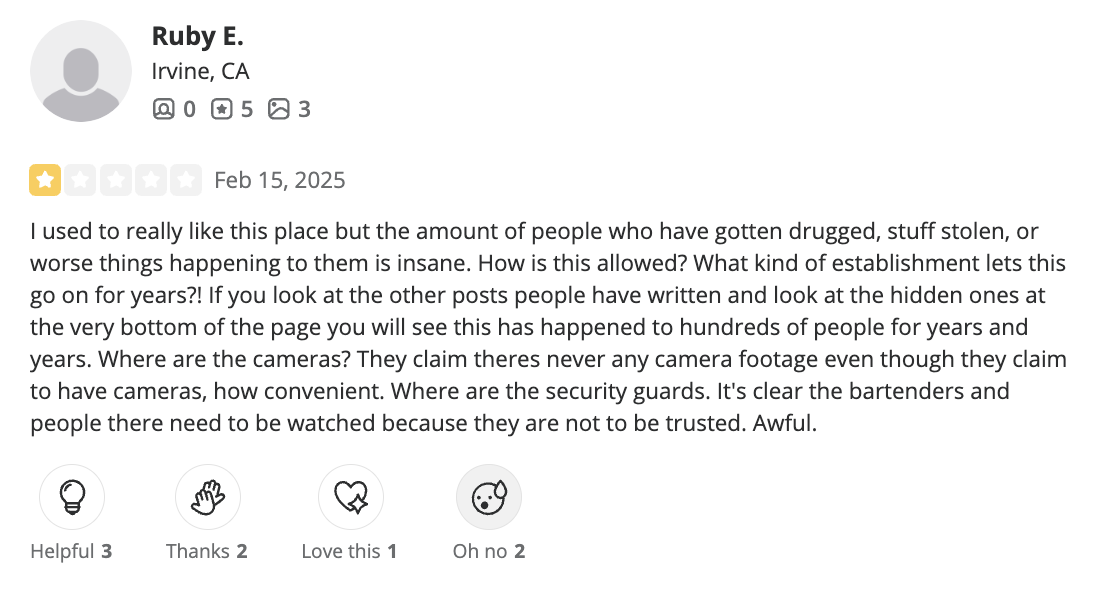
Lillard then posted to her 2,500 Instagram followers, asking if other people had had similar experiences. She received many responses.
“It was a lot of people who could relate or had similar stories or knew of similar stories,” she said. “But not a lot of shock.”
Asked for comment, The Abbey's PR firm, Dog and a Duck, directed Annenberg Media to a social media PSA campaign in late 2024, called Werk It & Watch It.
The PR firm also referenced a post narrated by Schukraft.
"Drink spiking is a crime, and unfortunately, it can happen anywhere," Schukraft said. "If you ever suspect your drink has been tampered with, report it immediately to us or law enforcement. If you’re unsure about your drink and want it remade, just ask—we’ll gladly make a fresh one. If you believe you’ve consumed a spiked drink, please go to the hospital, get checked, and request a toxicology report. We’ll be there to support you every step of the way."
Still, patrons of The Abbey have taken — and continue to take — to various social media platforms to share their stories, echoing similar sentiments to Lillard's.
Yelp alone features over 2,500 reviews of The Abbey, of which 472 are one-star. Many allege stolen phones and wallets and/or tampered drinks. Others say they asked staff for help and were met with indifference.
Ania Ahsan, a friend who was with Lillard at The Abbey, said she asked a bartender for some water for her friend and was asked to pay for it. Ahsan clarified that Lillard was feeling unwell and that she suspected she had been drugged. She said the staff remained unhelpful.
Others have gone a step further, alleging that they were drugged by the bartenders themselves.
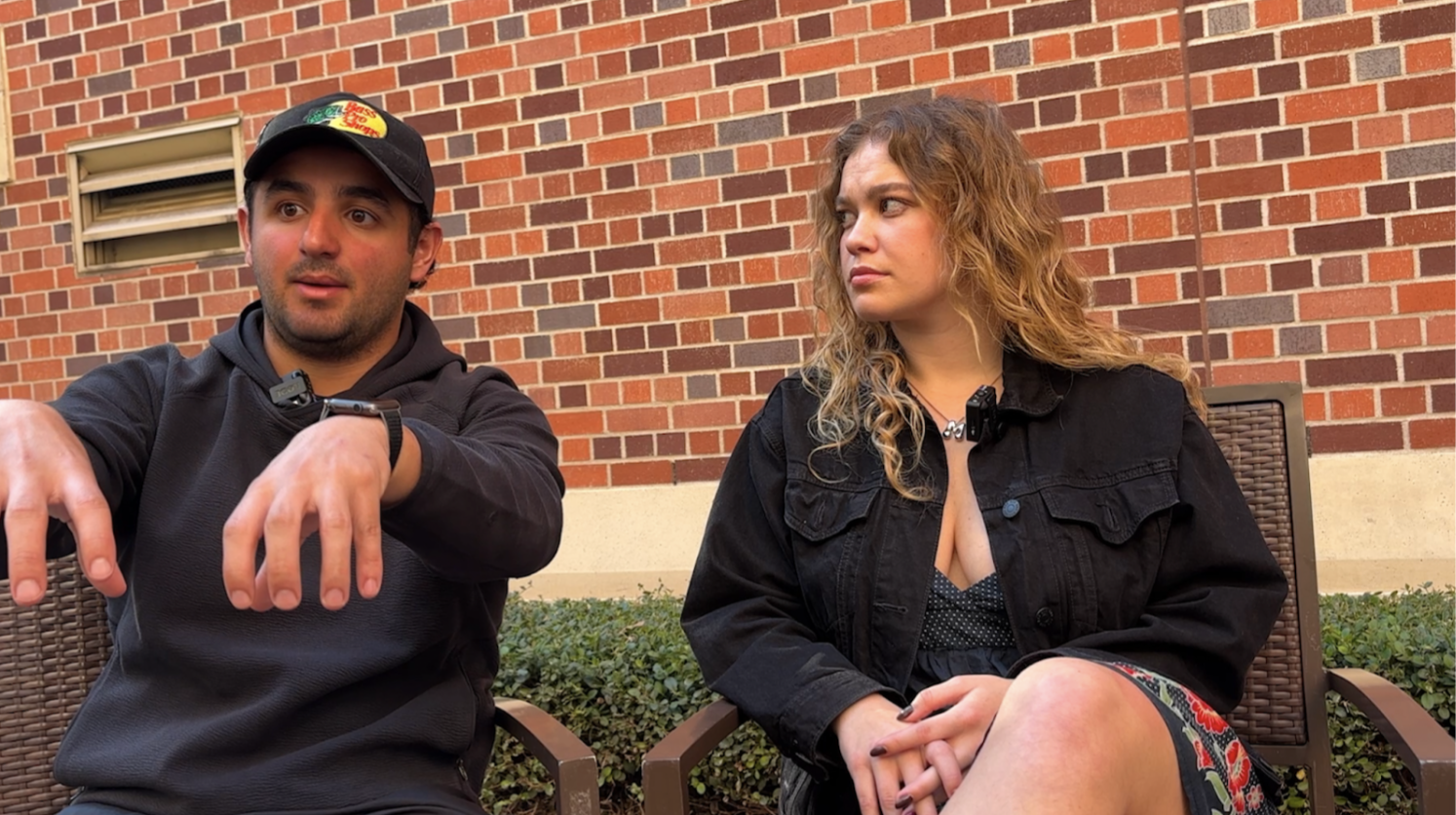
Quiñones models how the bartender served the drinks. Brown agreed that the bartender was the most likely culprit, though she noted how easy it is to slip something into someone’s drink.
Brown added that while she doesn’t “want to make any assumptions or accusations, it seems to [her] that someone behind the bar is the most likely culprit.”
Still, she acknowledged “how quick and how easy roofieing someone can be,” despite watching her drink closely.
Signs all over the bar warn patrons of pickpockets. In line to enter the bar, security announces warnings too. Still, it’s hard to avoid losing belongings in WeHo and at The Abbey, especially while inebriated (consensually or not.)
Even Chappell Roan said on the Call Her Daddy podcast that she’s "scared" to go back to the fabled Pink Pony Club because “my phone is gonna get f—ing stolen.”
A clip of Roan’s description of The Abbey garnered 3.3 million views and almost 700 replies on TikTok.



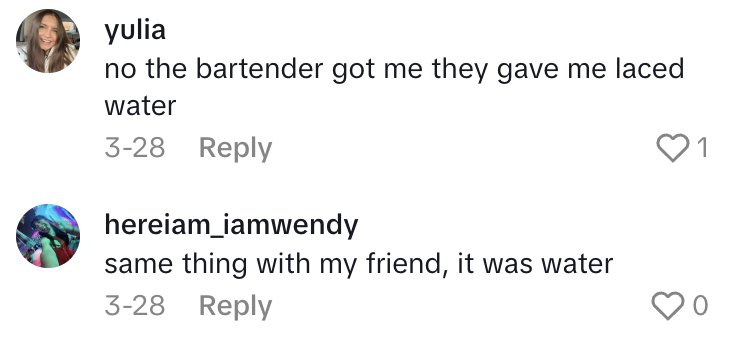
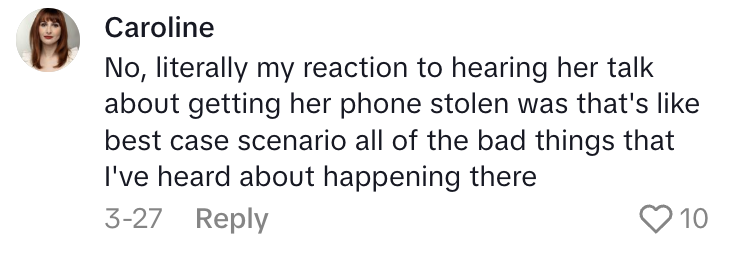
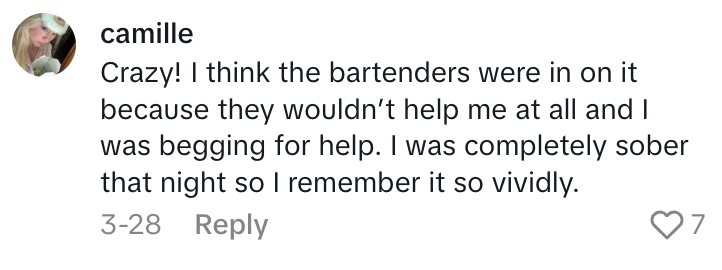
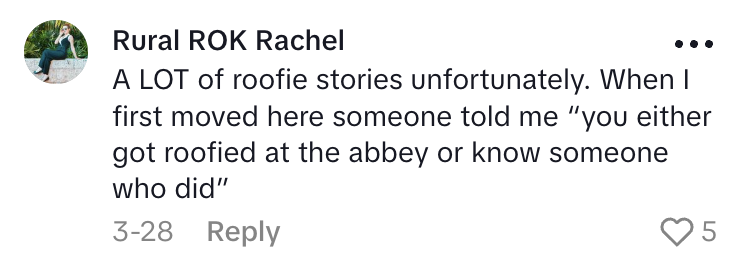






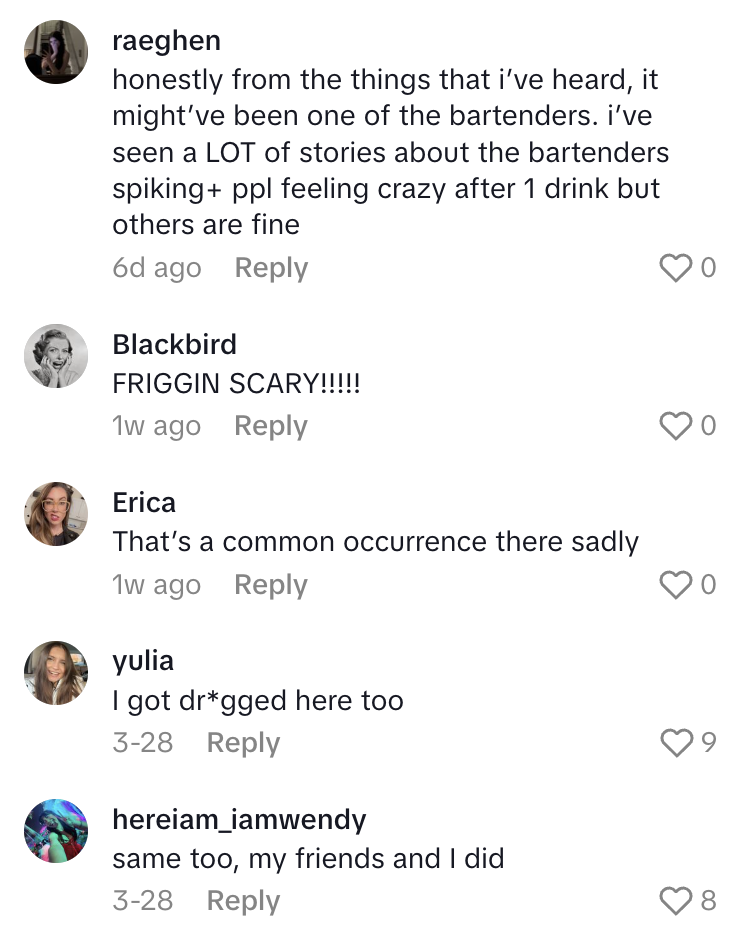






Chappell Roan said on the Call Her Daddy podcast that she was scared to go to the bar that inspired her hit song, citing pickpocket concerns. A few comments mentioned great times at The Abbey. Many more agreed with Roan and underscored the bar's alleged drink-spiking problem.
Many replies describe the “best times of my life”, but many more recount alleged instances of pickpocketing and roofieing.
Despite all the attention on social media, the most significant action taken wasn’t to The Abbey, but rather by The Abbey.
In August, 2021, Haely White took to Instagram to share her own experience, where she believes she was drugged. Her post went viral, accumulating over 4,400 likes (she averages about 1,300 per post,) over 600 comments (she averages 21 per post), and several direct messages.
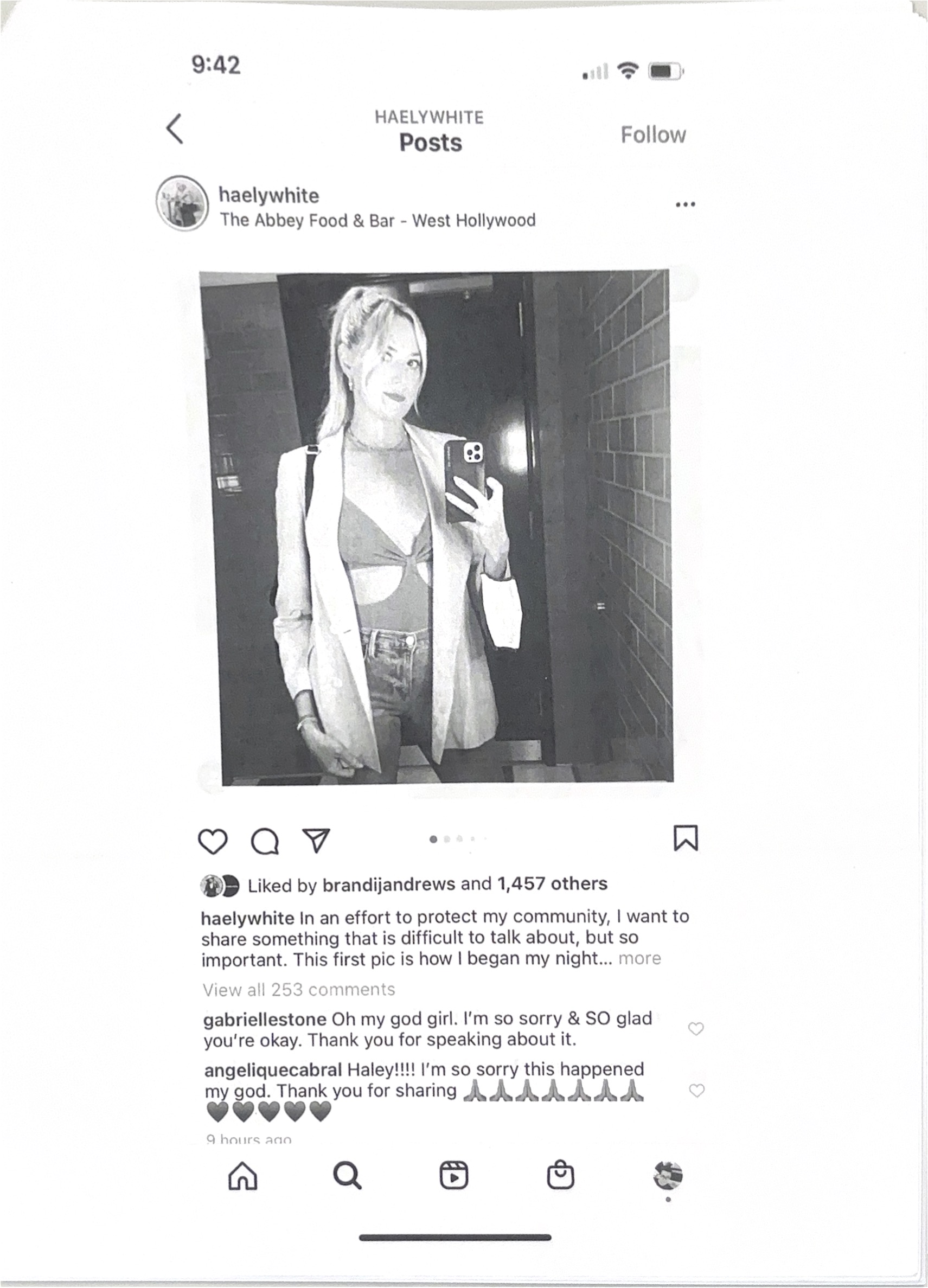
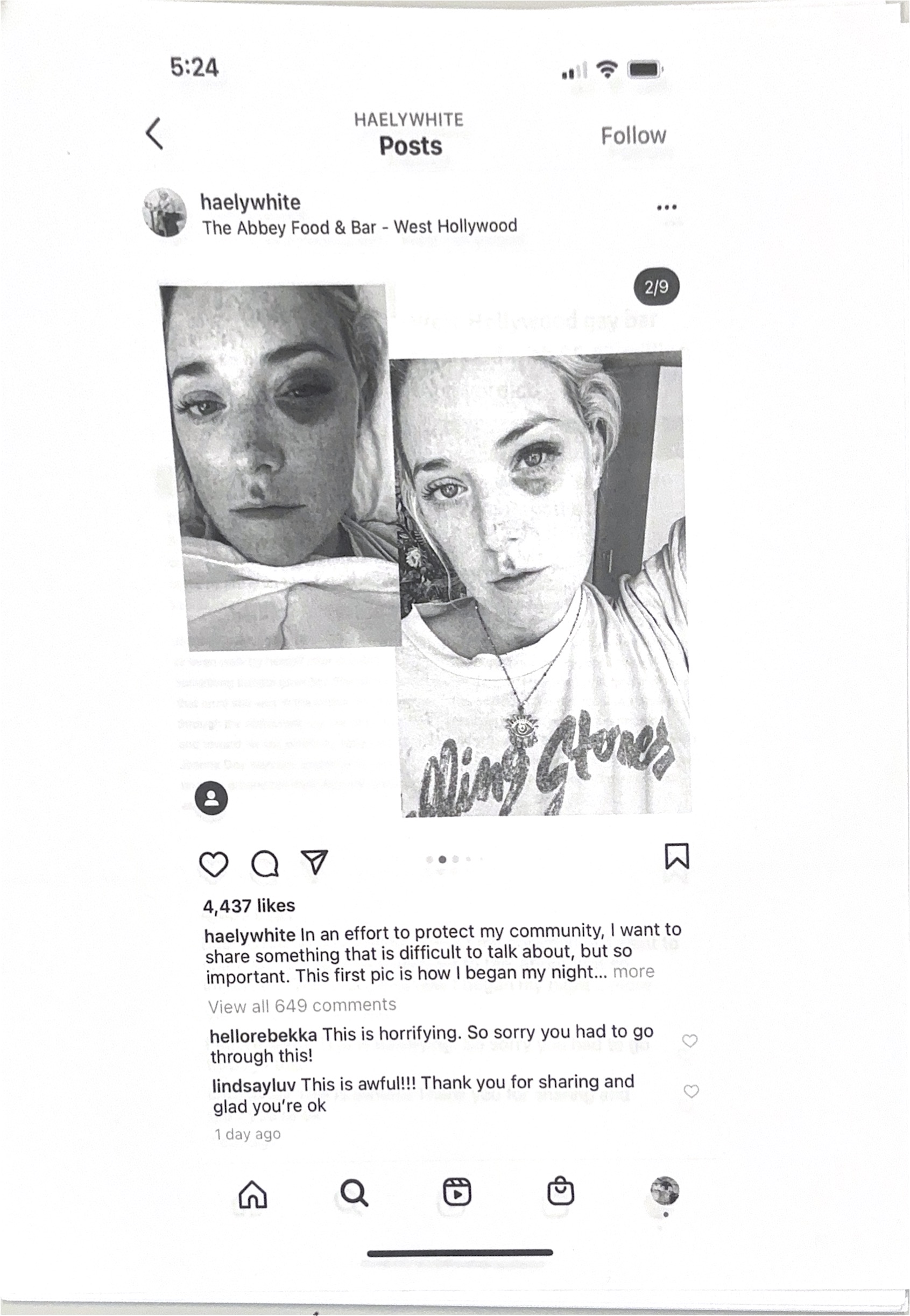
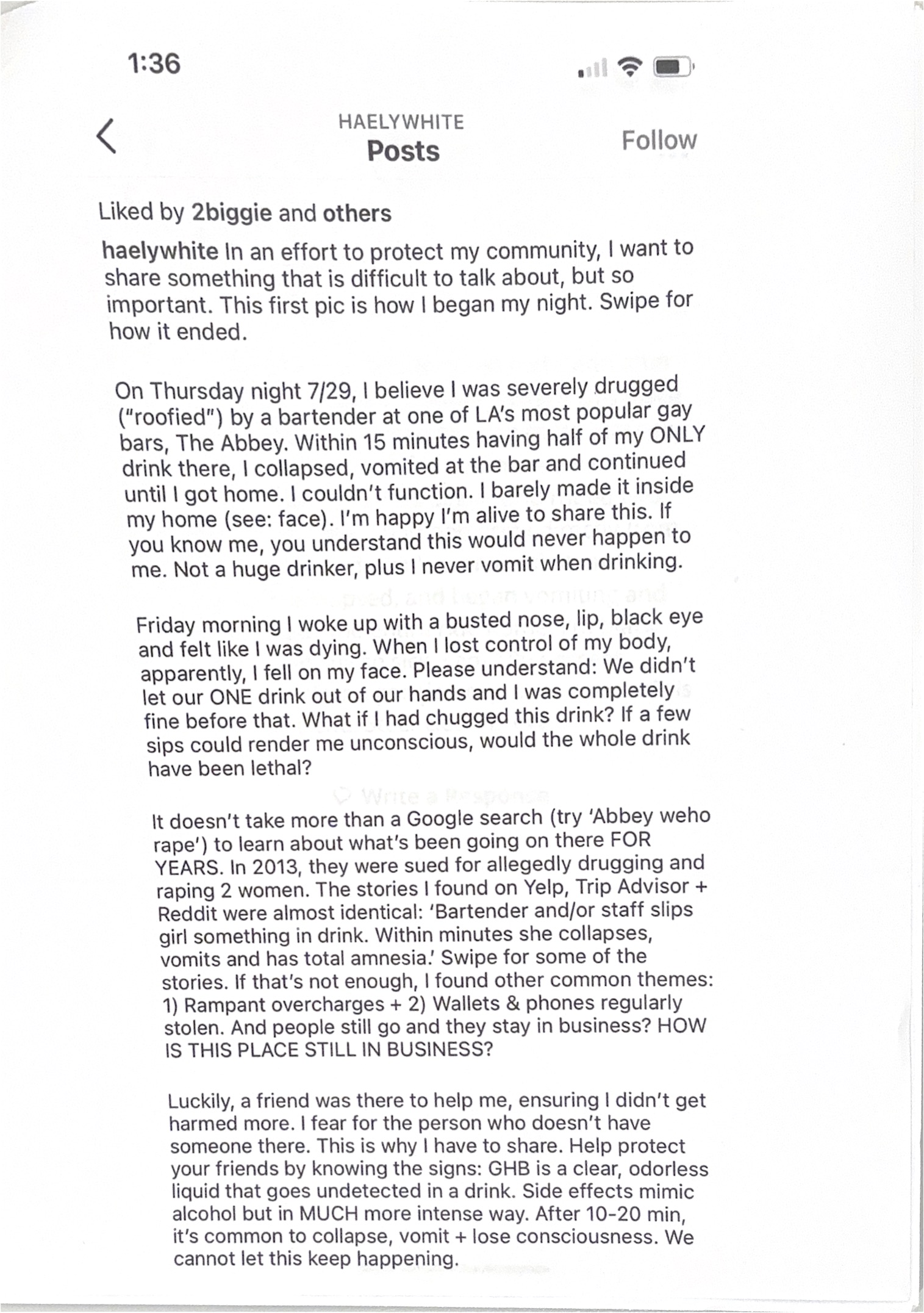
The Abbey responded aggressively, threatening to “begin filing [their] own defamation lawsuits against people who make online claims that are contradicted by our security footage and investigations by law enforcement.”
The bar showed White footage of her leaving her drink unattended for a period, prompting her to come to a legal agreement with the bar and make an apology post on Instagram.
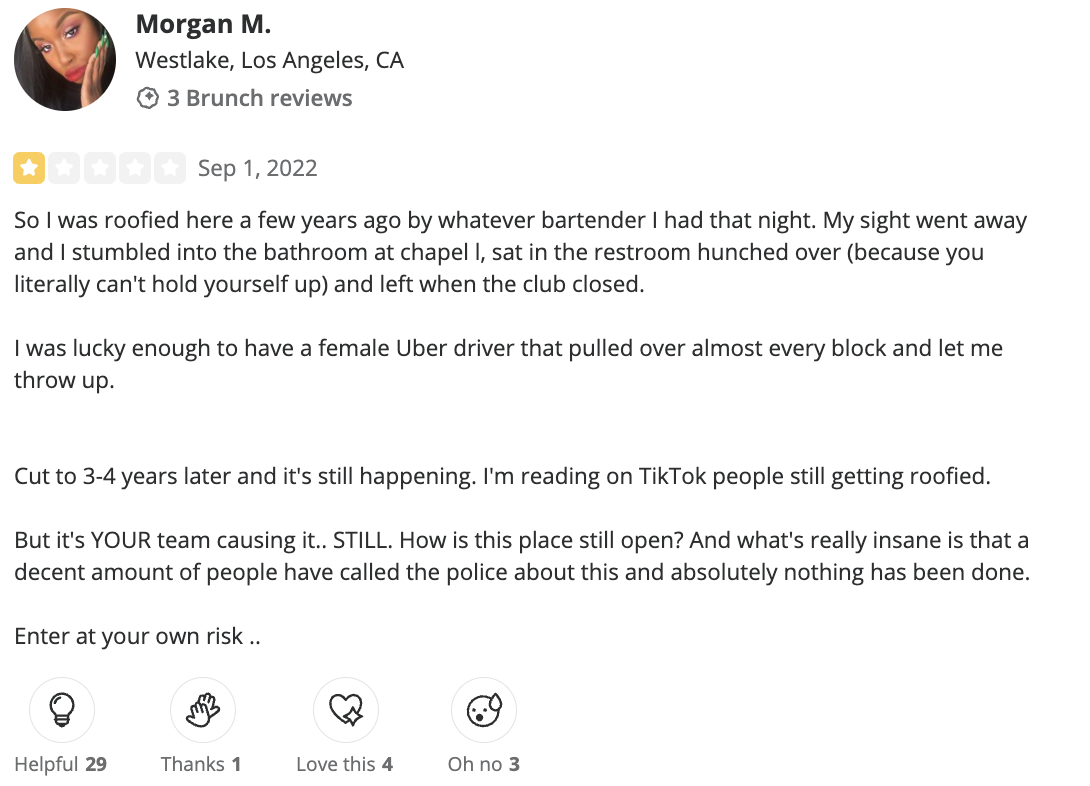
The next day, White clarified on a new post that while “[t]he video footage that [she had] reviewed does not show the bartender placing anything in [her] drink,” it also doesn’t mean nothing nefarious happened to her.
“There is an important additional detail — the footage also shows me collapsing off the seat at a booth not long after having my drink,” said White.
The Abbey proceeded to file a $5 million suit against White for defamation and breach of contract. The defamation claim was promptly dismissed as White was judged to have had reason to believe her drink had been tampered with, given previous articles and reviews online.
The breach of contract suit moved forward though, until the two sides finally settled in November, 2024, after more than three years of litigation.
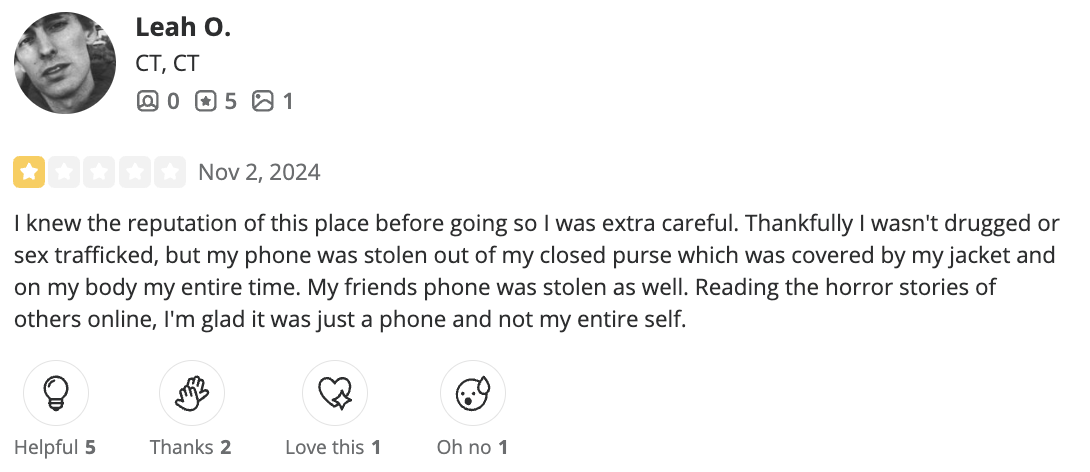
The 19th reported that over 70 people interviewed reported “drinking well under what they felt was their usual limit — in some cases consuming only soda or water — and experiencing disorientation to varying degrees or losing consciousness” at The Abbey.
After the suit was filed against White, more than half of them asked The 19th for their names or stories to be dropped, fearing legal retaliation from the bar.
Piecing Together
The morning after begins similarly for most.
The reality of what happened the night before starts to set in. For Lillard, it meant waking up in a hospital bed, disoriented and still without her normal motor skills, struggling to make sense of how she had ended up there.
The shock of realizing they had likely been drugged quickly shifts to a dark sense of relief.
Some consider filing a police report or reaching out to The Abbey. Jesse Magallanes, who was in L.A. visiting a co-worker from Toronto, had to file police reports in both L.A. and Canada to recover the $8,000 that was charged to his stolen credit card.
He said he called The Abbey four or five times to speak with the manager but never once heard back. Others, like Lillard and Brown, didn’t see the point in calling.
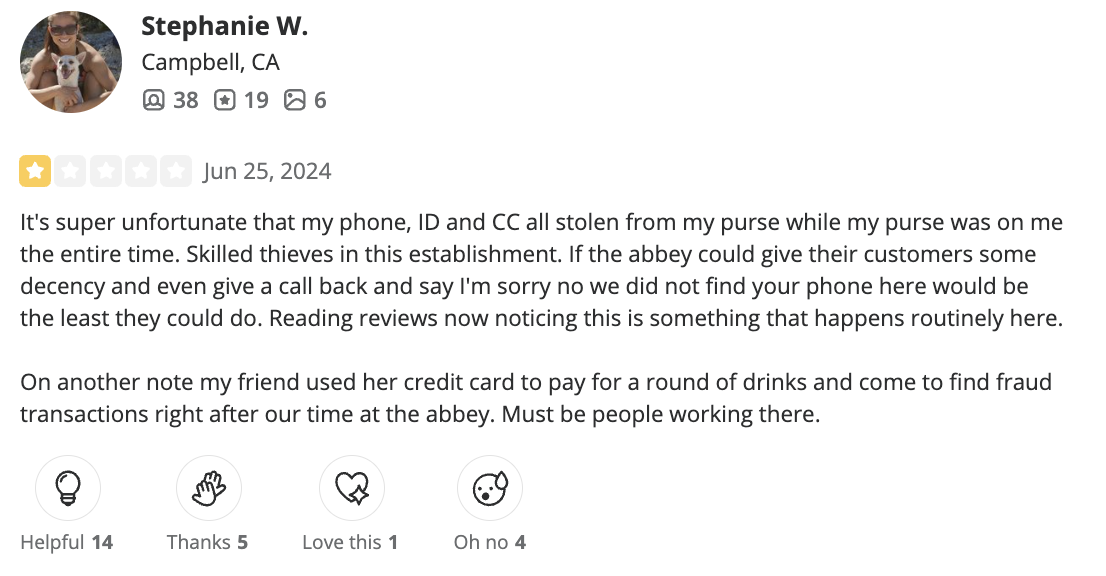
Carbone initially chalked his experience up to a miscalculation of his tolerance. Then he blacked out a second time. Then a third. Each time having consumed well-below the amount of alcohol that would typically make him feel intoxicated.
The pattern, he said, made him feel certain that he was roofied, whether by someone behind the bar or not.
“Anybody who’s ever had a strong drink or two of them can tell the difference between that and almost being hospitalized.”
Roofies — often referred to as “date rape” drugs — are generally used with the aim of taking further advantage of someone, according to Dr. Imir Metushi, a PhD in Pharmacology and assistant professor in Toxicology at UCLA..
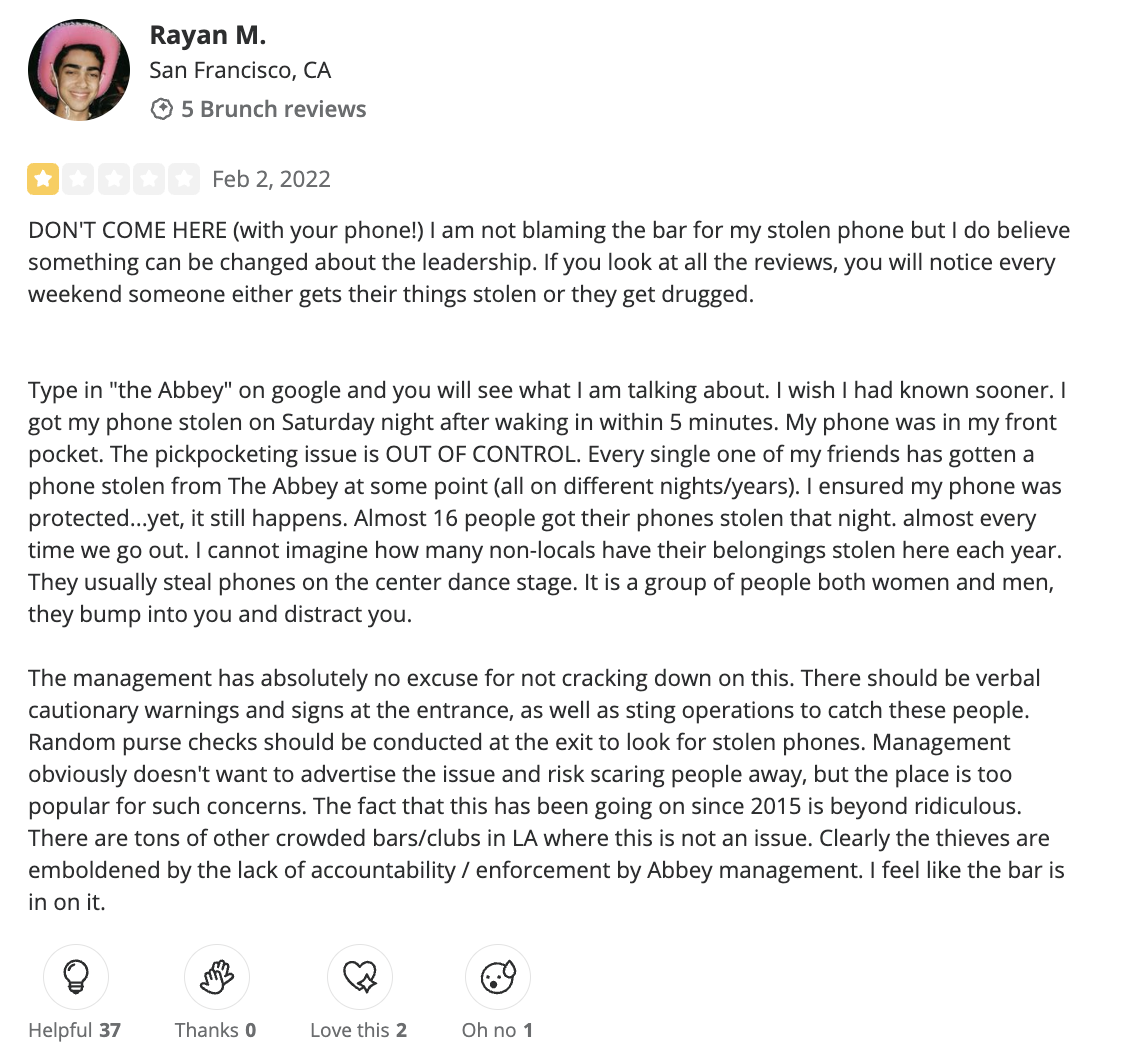
“It’s really disheartening to have that experience and be like, ‘Wow, in that moment, that is total confirmation that someone was not seeing me as a person,’” said Lillard. “Because you can’t look another person in the eyes and do that to them.”
Still, “just” being roofied can still create lasting trauma.
“It wasn’t until my sister told me the next afternoon what had happened to me last night,” said Brown, “that I was finally able to be like, ‘Oh my god… It happened to me.'”
Lillard, too, says the traumatic experience has stayed with her.
"I think about it weirdly often," said Lillard of her experience. "Not just the experience, but the 'what if?' And I tell everyone I know not to go to The Abbey. And also to cover their drinks, obviously."
Voices from The Abbey
Explore six first-hand accounts from those who visited The Abbey in West Hollywood and now share their harrowing experiences that followed. Each story provides a unique perspective, from waking up disoriented on the sidewalk to piecing together fragmented memories with the help of friends.
Maddy Brown with Adrian Quiñones
Maddy Brown recounts a night at The Abbey that started like any other — until a single drink led to her blacking out, a panic attack and large gaps in her memory. Her friend Adrian, who was with her that night, helps fill in the blanks as Maddy describes what she remembers and what still haunts her.
Adam Carbone
After multiple nights at The Abbey that left him blacked out, Adam Carbone now feels certain that he was drugged. He reflects on how one drink felt like seven, and how one unsettling experience after another made him question whether he was to blame — until he realized he wasn't.
Alie Muller with Kip Kipper
Alie Muller thought she was just having a couple drinks, but when she blacked out each of the only two times she went to The Abbey, she started to suspect something more. Her boyfriend Kip joins to recount what Alie can't — the moments she was conscious but no longer present.
Addie Lillard
Addie Lillard shared how a night out dancing at The Abbey ended with her in a hospital bed. She reflects on her nurse's chilling certainty of what had happened and her emotional recovery.
Jason M.
Jason M. chose to keep his last name private, but he didn’t hold back about what he calls one of the most terrifying nights of his life. From the last thing he remembers at The Abbey to waking up disoriented on a Venice Boulevard sidewalk, he shares his story to warn others.
Jesse Magallanes
Visiting from Toronto, Jesse Magallanes lost more than just his wallet and phone after a night at The Abbey. He recounts the thousands charged to his credit card and the frustration of feeling like his experience was dismissed by the bar's staff.
Help and Resources
If you believe you or someone you know has been affected by drink tampering or other forms of assault, there is help available.
- If you are experiencing severe symptoms, dial 911.
- A new law in California requires bars to offer drug testing devices upon request.
- The Los Angeles County Commission for Women provides an index of local sexual assault crisis centers.
- Rape, Abuse & Incest National Network (RAINN): 1-800-656-HOPE
- Local Counseling and Crisis Support Services
- Community Legal Aid Resources
